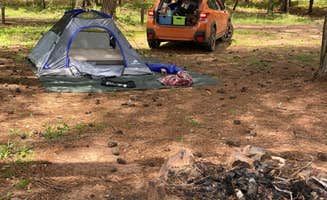Tent camping opportunities near Evans, Georgia center around the Clarks Hill Lake area, with most sites situated on or near the lakeshore. The region experiences hot, humid summers with temperatures often exceeding 90°F and mild winters with occasional freezing temperatures. Fall camping proves popular due to moderate temperatures in the 60-70°F range and reduced humidity, while spring brings significant rainfall that can affect campsite conditions.
What to do
Fishing access: Clarks Hill features excellent fishing opportunities directly from shore. Campers can target bass, crappie, and catfish without needing a boat. "Very clean park. Great fishing," notes Steven S., who found the uncrowded shoreline ideal for setting up multiple fishing spots.
Water recreation: Multiple campgrounds provide swimming access directly from campsites, with sandy beach areas at several points around the lake. When water levels are high in spring, some shoreline camping areas become limited, requiring earlier arrival to secure spots above the waterline.
Walking trails: Soap Creek Marina features accessible nature trails suitable for families with young children. A camper mentions, "Nice walking trails which makes this a great getaway spot." The paths remain relatively dry even after rainfall due to the sandy soil composition.
What campers like
Affordability: Budget-conscious campers appreciate the reasonable rates throughout the area. At Leroys Ferry, Stevie W. found it a "Great place for the whole family for fishing and camping," with sites priced well below commercial campgrounds despite waterfront locations.
Privacy between sites: Most campgrounds feature natural vegetation barriers between sites. Cody S. observed at Leroys Ferry that despite holiday crowds elsewhere, "I was the only camper there while all the other sites were packed. Sites are only a hundred feet or so from the lake."
Easy water access: Raysville Marina campsites offer direct water access for swimming and small craft launching. According to Jerry F., "Absolutely love this place. However hard to get a spot because so many people pay monthly and leave their campers."
What you should know
Payment systems: Most campgrounds operate on honor systems with drop boxes requiring exact change. No change machines are available at primitive sites. Credit cards are not accepted at most locations, so bring cash.
Water availability: Fell Hunt Camp provides well water through spigots. Brittany S. noted, "The water in the spouts is well water and delicious." Other campgrounds require bringing all water supplies.
Seasonal closures: Some campgrounds operate seasonally. Fell Hunt Camp is open "September 14 to January 4," coinciding with hunting seasons. During peak summer weekends, non-reservation campgrounds often fill by Friday afternoon.
Road conditions: Road quality varies significantly between campgrounds. At Pine Hill Camp, Eric Z. cautioned, "It's a sandy dirt road with some soft spots so pay attention," noting that while accessible, vehicles without adequate clearance may struggle during wet periods.
Tips for camping with families
Site selection for children: When camping with young children, choose sites away from steep shoreline drops. Some waterfront sites feature gradual entries while others have sudden drop-offs.
Bathroom considerations: Family campers should note limited toilet facilities. One camper mentioned Leroys Ferry has "pit toilets were kept very clean," but most campgrounds require bringing portable toilet solutions.
Wildlife awareness: Teach children proper food storage protocols as raccoons and possums frequently visit camps after dark. Hanging food bags from trees remains necessary even at established campgrounds.
Tips from RVers
Leveling challenges: RV campers face terrain difficulties at most tent campgrounds. Eric Z. from Pine Hill Camp noted, "Not a lot of level spots around but we found a spot that worked for our 37' fifth wheel with some leveling."
Solar considerations: RVers relying on solar power should request sites with southern exposure. At Pine Hill Camp, campers "were also able to position for decent solar exposure," which proved essential given the lack of hookups.
Connectivity issues: Cell service varies dramatically by carrier and location. At Pine Hill Camp, "T-mobile was pretty much useless, AT&T provided a little bit of usable signal," making advance planning necessary for those needing connectivity.


